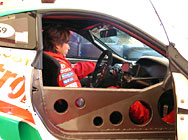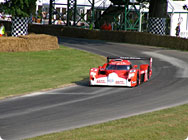 |
 |
| Once in the cockpit, Katayama instantly transforms into his professional racer persona. |
|
• I think there are a lot of young people out there that admire you and other F1 drivers, and who want to become F1 drivers themselves. Can you offer them some advice as to what they can do to make their dreams a reality?
“You know, it’s actually quite simple. Just never, ever give up. I say this to kids a lot when I speak to them. Can you think of anyone who was able to ride a bicycle on the first try? I tell them that they can do anything if they practice long and hard enough—whether it’s a kip-up or vault in gymnastics or swimming or whatever. It seems that when we become adults, we start getting our excuses ready—I don’t have any money, I don’t have any connections, I’m
too old, and so forth. And then there’s fear: What if I get fired? What if I lose all my money? And greed…I want this, I want that. Money becomes the only measure of success, and as a result, you lose the will to take on a challenge or chase your dreams. But it’s all a lie. The dreams we have as children never really go away. The important things—the answers—are still inside us. That’s why it’s important that you never give up chasing your dream. That’s
why you have to have a certain level of stoic discipline. If you can do that, then there’s nothing in this world that is too hard to accomplish. I want everyone to understand this. You get to the top of Mt. Everest one step at a time. In high school I told my guidance counselor that I was going to be an F1 driver, and I did it. There are many things you can do if you try. It’s just that most people don’t even try. You have to find your own measure of happiness and values, without
letting things discourage you or get you off course. And don’t overthink everything. I’m sure you’ve been moved by a motion picture, or have heard music that gives you goose bumps, right? That reaction is your own personal ‘sensor.’ It tells you what happiness is. If you follow it, you can always keep your pure childhood dreams in your heart. Follow it, and you’ll reach your dreams.”
|
My motivation: It's fun; it's my dream
• You’ve shown an amazing capacity for action, challenging mountains, and many types of races and rallies. What is it that drives you to stay in motion?
“First and foremost, I like a challenge. But I still have dreams that I’m going after. When I was younger, I used to use setbacks—being dumped by my girlfriend or flunking college exams—as motivation to keep me going. Now, I do things to encourage kids who don’t have parents, or who are sick. Actually, in Japan, charity work is sometimes viewed as more of a publicity stunt, but what I tell those kids is that there’s no such thing as failure in life. Even if you
hit a temporary setback, there’s something that is much more important than immediate results. I want them to know that taking on a challenge is the most important thing.”
 |
 |
| |
The TS020 boasts an intense power, making a majestic pass in front of the Goodwood crowd. |
• What is your dream right now?
“I have two. One is that everyone becomes more kind to each other—of course, everyone will have to become stronger to do that. It might seem obvious, but people should help someone if they fall down, or lend a hand to an elderly person who is having trouble at a crosswalk. People should take the time to help a blind person that might need assistance. We should be more kind to others like that. And as this attitude expands, then, for example, you’ll see less people practicing racing
on the streets, and causing accidents and so forth. I just wish everyone could be more kind. I will do what I can to make that happen. Now if you consider ‘eco’ factors to be part of this dream, then my second dream concerns my “ego.” I won’t win any praise or gold medals or anything—it’s strictly a personal dream, but my dream is to accomplish something in mountain climbing. Climb the world’s highest peaks during the coldest time of the year without
using oxygen. Or be the first Japanese to successfully climb the world’s 14 peaks over 8,000 meters. It’s a dream I have had since childhood. I really want to do it.”
• Finally, what does motorsport mean to you personally?
“Well, it’s my…it’s the proof of my existence. When I became champion in Japan, and then moved onto world racing, I learned that the world was much bigger, much different than I could have imagined. I had a life where I was living in Monaco, earning a tax-free salary of millions. I had a lot of cars. But there was something much more important than those things: I was driving in the F1 series with Senna, Mansell and Schumacher! Here was this kid who grew up in a nothing town
in Sagamihara—one time when I was little I fell in a cesspit and stunk for a week! But motorsports showed me a world where I could fight on sheer willpower and guts, and find a brighter future for myself. In a sense, it was a system that taught me about life. And everyone in F1 had an extremely professional and sincere attitude. I’m just an ordinary person, but I’m proud that at one time I was called the “Kamikaze,” chasing down Senna and Schumacher. My time in F1 is
passed, but the fire inside is still burning. I still have much more to accomplish.”
|